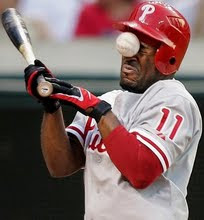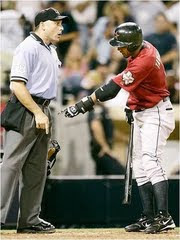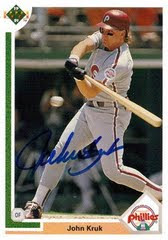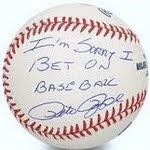There seems to be no clear cut MVP candidate for the AL. The vast vast majority of the time an offensive player wins the MVP award, but when the offensive class becomes weak, we start to hear rumblings and grumblings of the Cy Young winner deserving the MVP (see: Johan Santana in 2006 when his teammate Justin Morneau, undeservingly, won the MVP). We're starting to see that this year with everyone seemingly on the Justin Verlander bandwagon. I won't scream outrage if Verlander wins it, but I don't believe he does deserves it.
I believe Jacoby Ellsbury does.
First, I'll give my arguments why I believe Ellsbury is the best player in the American League. Then, I will give reasons why Ellsbury is better than the two other leading AL MVP candidates: Jose Bautista and Justin Verlander.
The main reason why I believe Ellsbury deserves the MVP is because he has the best WAR (9.2) in the American League. He actually has the best WAR in all of baseball. No one else has a WAR above 9.0- except Ellsbury.
I think people think of Ellsbury as this speed guy who can steal 70 bases and is a pretty decent lead off man. But in 2011 he changed his entire game by adding power and a lot of it. Right now Jacoby Ellsbury has 31 home runs- which is tied for 5th in the AL. Ellsbury actually leads his team in home runs. He has more homers than Adrian Gonzalez (27), David Ortiz (29), and Dustin Pedroia (20). However, I believe this perception that Ellsbury still is this speed guy plus the fact that he plays with such offensive powerhouses overlooks just how good Ellsbury has been on offense.
Ellsbury's triple slash line is this: .322/.377/.551. Ellsbury is hitting the ball, hitting the ball with power, and getting on base. That's two of the five tools right there.
While Ellsbury is hitting for power he still has retained his speed stealing 38 bases (4th in the American League) and is the only American League player in the 30/30 club this year. That's three out of the five tools.
Despite how good Ellsbury has been on offense this year, the main reason he deserves to be the AL MVP is because of the fourth tool- his defense. There are absolutely at least five other AL offensive players that are better than Ellsbury, but they do not have the kind of defense that Ellsbury has. Ellsbury is 4th in the AL in defense according to the Fangraphs Fld stat, 5th in the AL in UZR/150, and 2nd in the AL in Revised Zone Rating. No matter what defensive metric you use, Ellsbury has been amazing at it.
Bill Simmons thinks (and frankly so does most baseball fans) that the MVP should go to the best offensive player. Simmons thinks one should vote on MVP candidates based on how fearful do pitchers feel pitching to a particular batter. I think this is faulty reasoning in today's day and age considering all we know and can measure about baseball players. While offense is obviously extremely important, it's ignorant to think that you should discount a players defense when half of every game a player plays he is also on defense. We can now measure (admittedly not with the great preciseness and efficiency that we can measure offense) how well a player plays on defense and how that contributes to how many wins they add to their team.
As DME posted in this article about how he believed Chase Utley deserved the 2009 NL MVP over Albert Pujols, defense matters- especially the defensive position you play. Ellsbury plays at a premium defensive position (CF) and is very good there.
I will note that Ellsbury is terrible at the last of the five tools- defensive arm- but to me that's the worst of the five tools, an overrated measure of any player's game, and is probably an archaic notion by now- especially if you have fantastic range.
Now let's talk about why Ellsbury deserves the MVP over Jose Bautista. The simple and easy answer is defense. While Jose Bautista is far and away the best offensive player in the American League (1st in wOBA, OBP, and SLG) he still is 0.8 points behind Ellsbury in WAR- because his defense actually helps lose games for Toronto. Bautista has a -4.5 Fld, -11.2 UZR/150, and a .922 RZR (good for only 15th in the AL). Plus, Bautista plays at a non-premium defensive position (RF).
DME argued with me that Baustita deserves the MVP more than Ellsbury because when two players are close in who deserves to be the MVP, you have to discount defense because you can't really measure it as well as offense so you have to use offense as the tiebreaker. I think this logic is flawed in two ways. First, the basic premise of this argument discounts everything baseball has done in the past five to ten years establishing defensive statistics. If you're going to discount the metrics we have available to us to determine MVP candidates then you need to discount them entirely. You either believe in them or you don't. You can not say you believe in them in one aspect but not in another. Next, he says that different sites and experts have different evaluations of how to measure defense which contributes to why defense should be discounted. How Fangraphs measures defense is much different than how The Hardball Times measures it. However, no matter if you're using an old school scout's eye or an advanced stats website, Ellsbury is far and away the better defender this year.
Lastly, I believe Ellsbury deserves the award over the great Justin Verlander. People seem to forget just how much pitching only 35 games out of the 162 game season limits how much you contribute to how many wins your team has. Currently Justin Verlander only has a 7.0 WAR. Ellsbury, Bautista, Dustin Pedroia, Curtis Granderson, and even Ian Kinsler have better WARs than Verlander. In fact, Verlander is tied for first in pitching WAR with C.C. Sabathia! Verlander's not even the clear cut #1 picther in his league (although he obviously is the AL Cy Young winner and the best pitcher in the AL in 2011).
The only way I'll give an MVP to a pitcher is if the pitcher has one of the greatest pitching seasons ever. While Verlander has having a very good season, this season doesn't come close to either of Pedro Martinez's 1999 or 2000 seasons (and both of those seasons even Pedro didn't win the MVP). As much as I like and respect Verlander and his amazing season, he doesn't play in enough games to deserve the MVP. That's why we have a Cy Young category to begin with.
In conclusion, GO ELLSBURY! I'm fine sitting on this island by myself. If you believe Verlander or Bautista deserves the MVP more than Ellsbury, that's fine and I won't vehemently diagree with you. If you believe anyone else like Granderson or AGon deserves the MVP then you're an idiot and I will vehemently disagree with you.
Showing posts with label Justin Verlander. Show all posts
Showing posts with label Justin Verlander. Show all posts
Justin Verlander Entered Into An Unconscionable, Voidable Contract For Milk In The 10th Grade
Posted by
David "MVP" Eckstein
on Sunday, July 11, 2010
Per Sports Illustrated:
On his [Justin Verlander's] deal with friend Daniel Hicks in 10th gradeAnd I thought Milk was expensive at $3.15 a gallon.
I wanted a chocolate milk that cost 50 cents, and I didn't have the money. So I said, "How about I give you. 1 percent of my pro signing bonus if you give me 50 cents now?" He found a napkin, wrote it up, and I signed it. I forgot about it, but after I signed, he comes over and whips out this old napkin. I'm like, Oh my God! My bonus was three-point-something million. Was a chocolate milk worth $3,000? I want to say yes. I was parched.
Verlander or King Felix?
Posted by
David "MVP" Eckstein
on Wednesday, February 3, 2010
According to AP (through ESPN), the Tigers and Justin Verlander have come to an agreement on a five-year, $80 million deal. This comes on the heels of King Felix's five-year, $78 million dollar deal. In terms of value, both pitchers are quite comparable. Since 2006, Verlander has been worth +3.1, +4.1, +3.4, and +8.2 WAR; cumulatively +18.8 WAR. King Felix, on the other hand, has posted +3.8, +4.1, +3.9, and +6.9 WAR seasons in that same time frame (he also posted a +2.6 WAR half-season in 2005); cumulatively, +18.6 WAR. On the surface, the two pitchers seem equally worthy of the deals they signed. The current market value of 1 WAR is approximately $3.5 million. If we pessimistically assess both pitchers as +4.5 WAR players each of the next five years, then each would provide their respective team with +22.5 WAR, or $78.5 million in free agency value. It would seem like both the Tigers and Mariners are simply locking each pitcher up "at market value," but its important to note that 1) premium arms tend to come at a premium price and 2) each team is in such a position to compete for a playoff position that the marginal value of a win may be worth more than market value. This assessment of "market value" also assumes that both Verlander and King Felix average "only" +4.5 WAR per season through their prime years.
Though I see both contracts as quality signings for their respective teams, it is an important question to ask whether or not Verlander deserves more money than King Felix. Verlander has a negligibly higher cumulative WAR since 2006 and 7 more wins in 6 less starts than Felix Hernandez, but King Felix bests Verlander in terms of career numbers in the following categories:
Taking all of this data as a whole, I would say that Felix Hernandez is the one who deserves the higher paid contract. Verlander had the better breakout year, but in both fantasy and real life terms, King Felix will be the more valuable (and younger player). Felix already has better peripherals and -- based on age, defense and park dimensions -- seemingly more superficial upside come years four and five of the contract.
In the short term, however, both players should provide comparable value. CHONE pegs Justin Verlander as being worth +49 runs prevented compared to the average pitcher (RPAA) over 194 IP, while Felix Hernandez is projected as a +50 RPAA pitcher per 200 IP.
Though I see both contracts as quality signings for their respective teams, it is an important question to ask whether or not Verlander deserves more money than King Felix. Verlander has a negligibly higher cumulative WAR since 2006 and 7 more wins in 6 less starts than Felix Hernandez, but King Felix bests Verlander in terms of career numbers in the following categories:
- ERA (3.45 v. 3.92)
- FIP (3.54 v. 3.78)
- xFIP (3.43 v. 4.14)
- BB/9 (2.68 v. 3.02)
- K/9 (8.18 v. 7.99)
- GB% (53.4% v 39.7%)
- Age (born in 1986 v. 1983)
Taking all of this data as a whole, I would say that Felix Hernandez is the one who deserves the higher paid contract. Verlander had the better breakout year, but in both fantasy and real life terms, King Felix will be the more valuable (and younger player). Felix already has better peripherals and -- based on age, defense and park dimensions -- seemingly more superficial upside come years four and five of the contract.
In the short term, however, both players should provide comparable value. CHONE pegs Justin Verlander as being worth +49 runs prevented compared to the average pitcher (RPAA) over 194 IP, while Felix Hernandez is projected as a +50 RPAA pitcher per 200 IP.
Do You Believe In Justin Verlander?
Posted by
David "MVP" Eckstein
on Friday, May 1, 2009
My name is David "MVP" Eckstein, and I'm a Verlandaholic. Before I really paid attention to sabermetrics, I used to draft Verlander high. I've been clean for about a year now, but I'm tempted to relapse. Help me.
In 2006, I touted him as being second to only Lirano among new pitchers. His consistently high 90s fastball and mid 70s curveball were a recipe for nasty domination. The result of his stuff was some quality strikeouts, average control and slight groundball tendencies. Since his debut, however, Verlander's walk rate has increased, his worm burning tendencies have declined and his fastball slowly, but steadily lost 2.5 MPH in velocity. Entering this season, Verlander's FIP has only been below 4.00 once -- in 2007, his breakout year, when it was 3.99 -- in his entire career. Despite playing in front of a laughably poor defense, Verlander consistently outperformed his FIP from 2006-2007. Realizing this, I avoided him in 2008 -- and was rewarded for my abstinence. Verlander posted a 4.84 ERA over 201+ IP, his K rate slipped a full K lower than it was in 2007 and a career low in WHIP (1.4).
But all was not as terrible as one would think. In 2008, Verlander's peripherals -- GB/FB rate aside -- all increased over his 2006 levels. Verlander's K rate was a full strikeout per nine higher than his 2006 level and his home run per nine rate has falled from 1.02 per nine to .89 per nine to .81 per nine. Even though Verlander was giving up less groundballs, he was increasing his infield fly ball rate by a large margin (it almost doubled). The result of Verlander's 2008 campaign was his second best career FIP -- 4.18, a full 2/3 of a run lower than his ERA.
This season, Verlander's fastball velocity is back to its 2005/2006 level (95.3 MPH) and his strikeout rate is back up (above) his 2007 level. While I wouldn't expect Verlander to continue to strike out 10+ guys per nine, he's shown that he has the stuff to sustainably strikeout somewhere between 8 and 9 per nine over the course of a 200+ inning season. Verlander's GB/FB is also down, but his pitch selection remains largely unchanged from the past two seasons, so even with some downturn, it's unlikely that it was sustainably have halved over the course of one season. Furthermore, most of the groundballs Verlander used to give up have been converted into infield fly balls (up 5% over last season). His HR/9 is a bit higher than last season -- but still below league average -- but that may be the result of his first outing, in which he gave up a gopher ball that knocked him out of the game before the end of the 4th inning.
Verlander's Walk Rate currently sits at 2.9 walks per nine, slightly below his career average, but right in line with his 2006-2007 numbers. Verlander has only once (last season) walked more than 3 per nine in his career. To expect a persistent 33% regression in one's control is rare (well, tell that to Rick Ankiel, Rich Hill, Daniel Cabrera...). From 2005 to 2007, Verlander's control (K/BB) increased from 1.4 to 2.07 to 2.73. And though his control regressed a bit in 2008 (to 1.87), it currently sits at a robust 3.78. I wouldn't expect a 3+ K/BB to persists, but a mid 2's -- somwhere between his 2006 and 2007 levels -- is very reasonable.
Justin Verlander currently stands as the most unfortunate pitcher in baseball. His FIP-ERA splits are the worst in the league (his FIP is 3.22, his ERA is 6.75) thanks to a .408 BABIP (Verlander's career BABIP is .303) and 50.3 LOB% (league average is 72%). He's also only 25 years old, so making gains in his control and ability at this point in his career is quite reasonable. PECTOA issued Verlander a 27% breakout rate and 60% improve rate this season, matched against 11% attrition and 11% collapse rate.
Taking note of all of this, I think I'm ready to drink the Verlander juice and buy low. Are you?
In 2006, I touted him as being second to only Lirano among new pitchers. His consistently high 90s fastball and mid 70s curveball were a recipe for nasty domination. The result of his stuff was some quality strikeouts, average control and slight groundball tendencies. Since his debut, however, Verlander's walk rate has increased, his worm burning tendencies have declined and his fastball slowly, but steadily lost 2.5 MPH in velocity. Entering this season, Verlander's FIP has only been below 4.00 once -- in 2007, his breakout year, when it was 3.99 -- in his entire career. Despite playing in front of a laughably poor defense, Verlander consistently outperformed his FIP from 2006-2007. Realizing this, I avoided him in 2008 -- and was rewarded for my abstinence. Verlander posted a 4.84 ERA over 201+ IP, his K rate slipped a full K lower than it was in 2007 and a career low in WHIP (1.4).
But all was not as terrible as one would think. In 2008, Verlander's peripherals -- GB/FB rate aside -- all increased over his 2006 levels. Verlander's K rate was a full strikeout per nine higher than his 2006 level and his home run per nine rate has falled from 1.02 per nine to .89 per nine to .81 per nine. Even though Verlander was giving up less groundballs, he was increasing his infield fly ball rate by a large margin (it almost doubled). The result of Verlander's 2008 campaign was his second best career FIP -- 4.18, a full 2/3 of a run lower than his ERA.
This season, Verlander's fastball velocity is back to its 2005/2006 level (95.3 MPH) and his strikeout rate is back up (above) his 2007 level. While I wouldn't expect Verlander to continue to strike out 10+ guys per nine, he's shown that he has the stuff to sustainably strikeout somewhere between 8 and 9 per nine over the course of a 200+ inning season. Verlander's GB/FB is also down, but his pitch selection remains largely unchanged from the past two seasons, so even with some downturn, it's unlikely that it was sustainably have halved over the course of one season. Furthermore, most of the groundballs Verlander used to give up have been converted into infield fly balls (up 5% over last season). His HR/9 is a bit higher than last season -- but still below league average -- but that may be the result of his first outing, in which he gave up a gopher ball that knocked him out of the game before the end of the 4th inning.
Verlander's Walk Rate currently sits at 2.9 walks per nine, slightly below his career average, but right in line with his 2006-2007 numbers. Verlander has only once (last season) walked more than 3 per nine in his career. To expect a persistent 33% regression in one's control is rare (well, tell that to Rick Ankiel, Rich Hill, Daniel Cabrera...). From 2005 to 2007, Verlander's control (K/BB) increased from 1.4 to 2.07 to 2.73. And though his control regressed a bit in 2008 (to 1.87), it currently sits at a robust 3.78. I wouldn't expect a 3+ K/BB to persists, but a mid 2's -- somwhere between his 2006 and 2007 levels -- is very reasonable.
Justin Verlander currently stands as the most unfortunate pitcher in baseball. His FIP-ERA splits are the worst in the league (his FIP is 3.22, his ERA is 6.75) thanks to a .408 BABIP (Verlander's career BABIP is .303) and 50.3 LOB% (league average is 72%). He's also only 25 years old, so making gains in his control and ability at this point in his career is quite reasonable. PECTOA issued Verlander a 27% breakout rate and 60% improve rate this season, matched against 11% attrition and 11% collapse rate.
Taking note of all of this, I think I'm ready to drink the Verlander juice and buy low. Are you?






